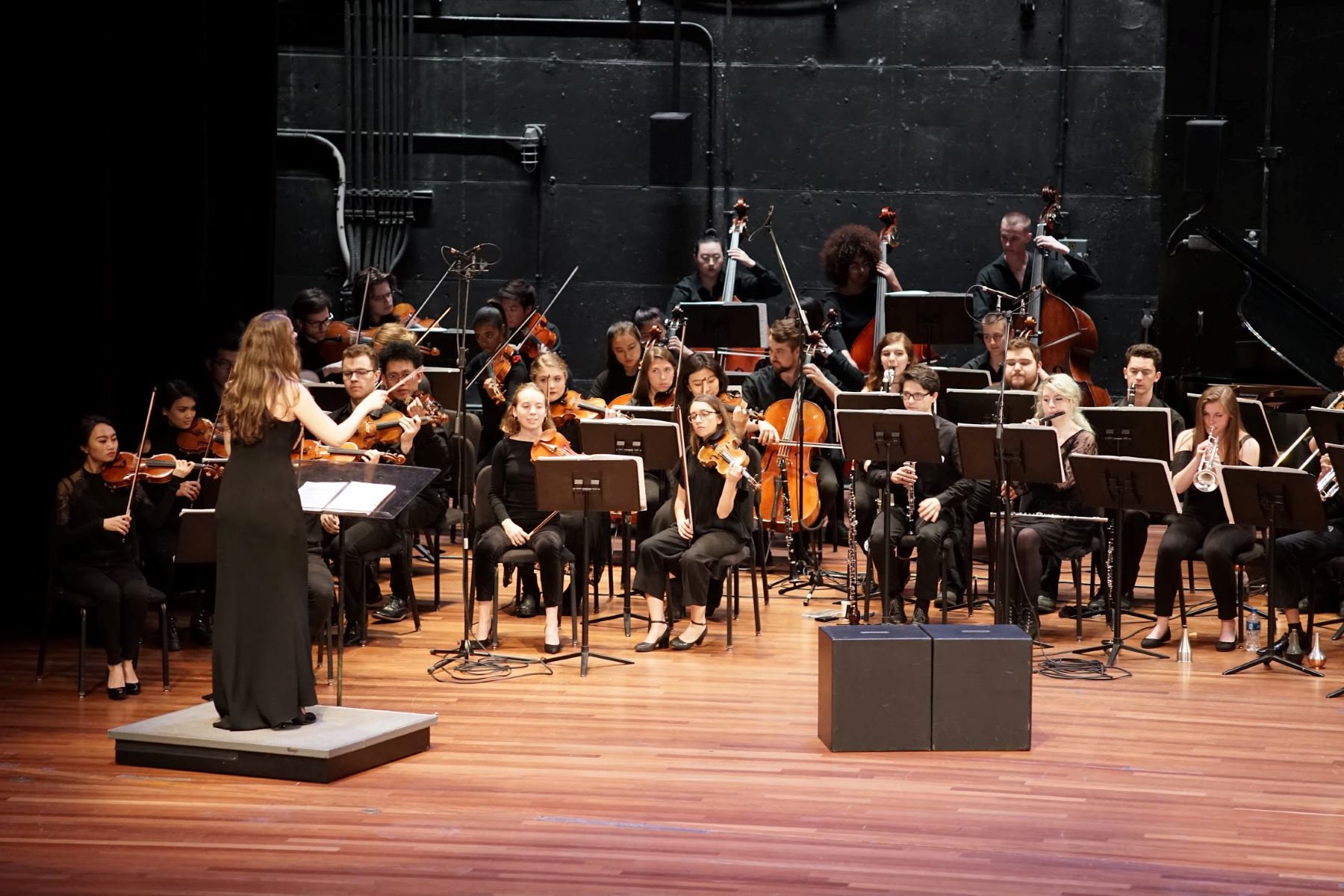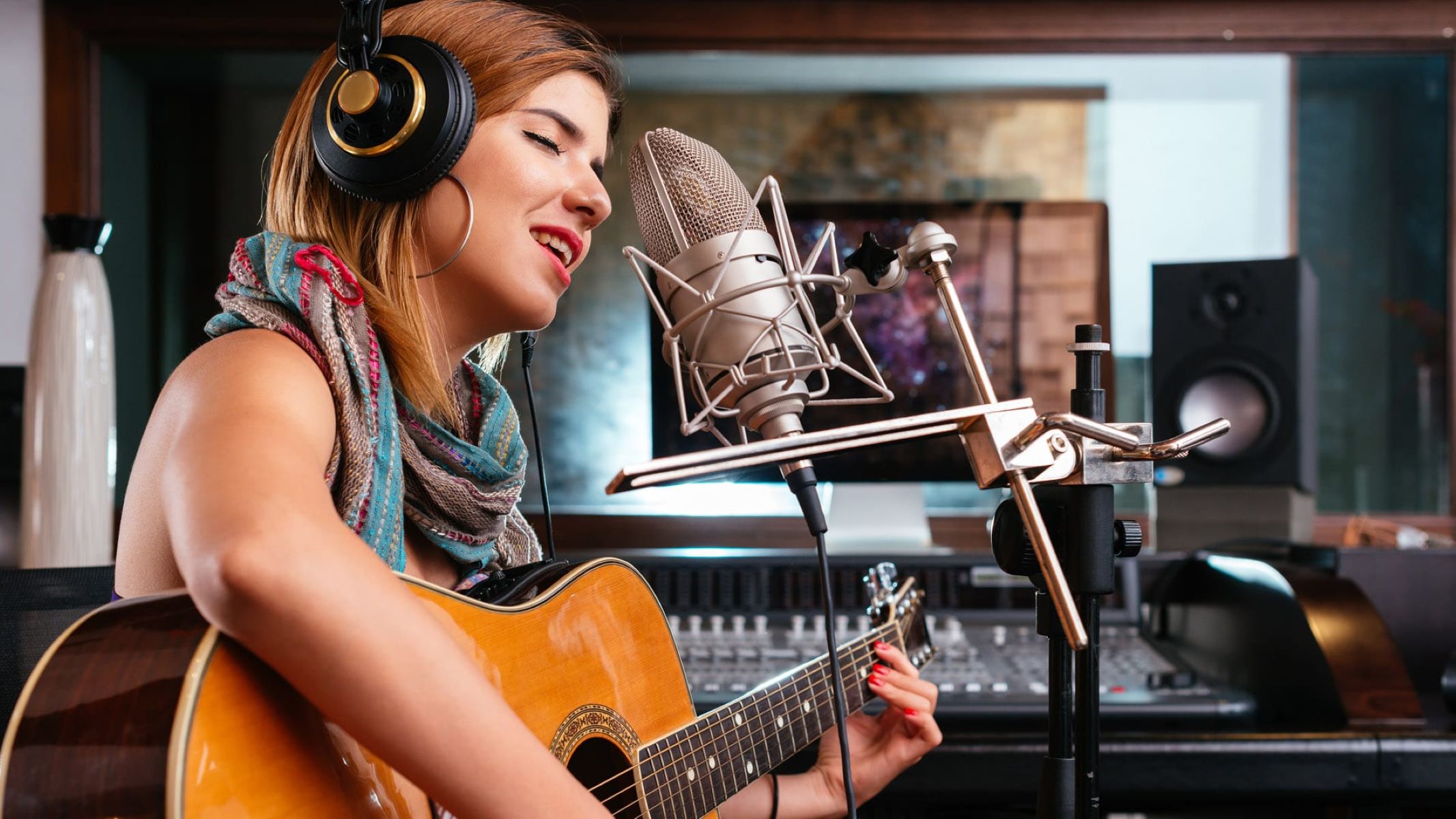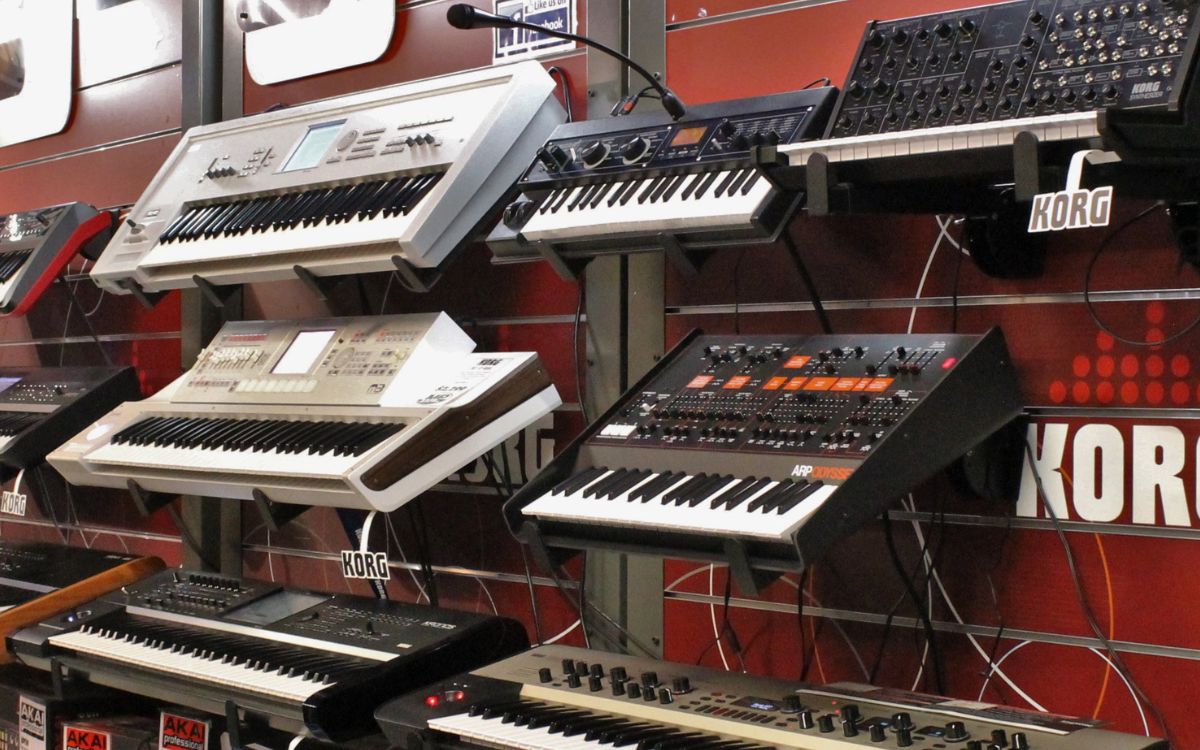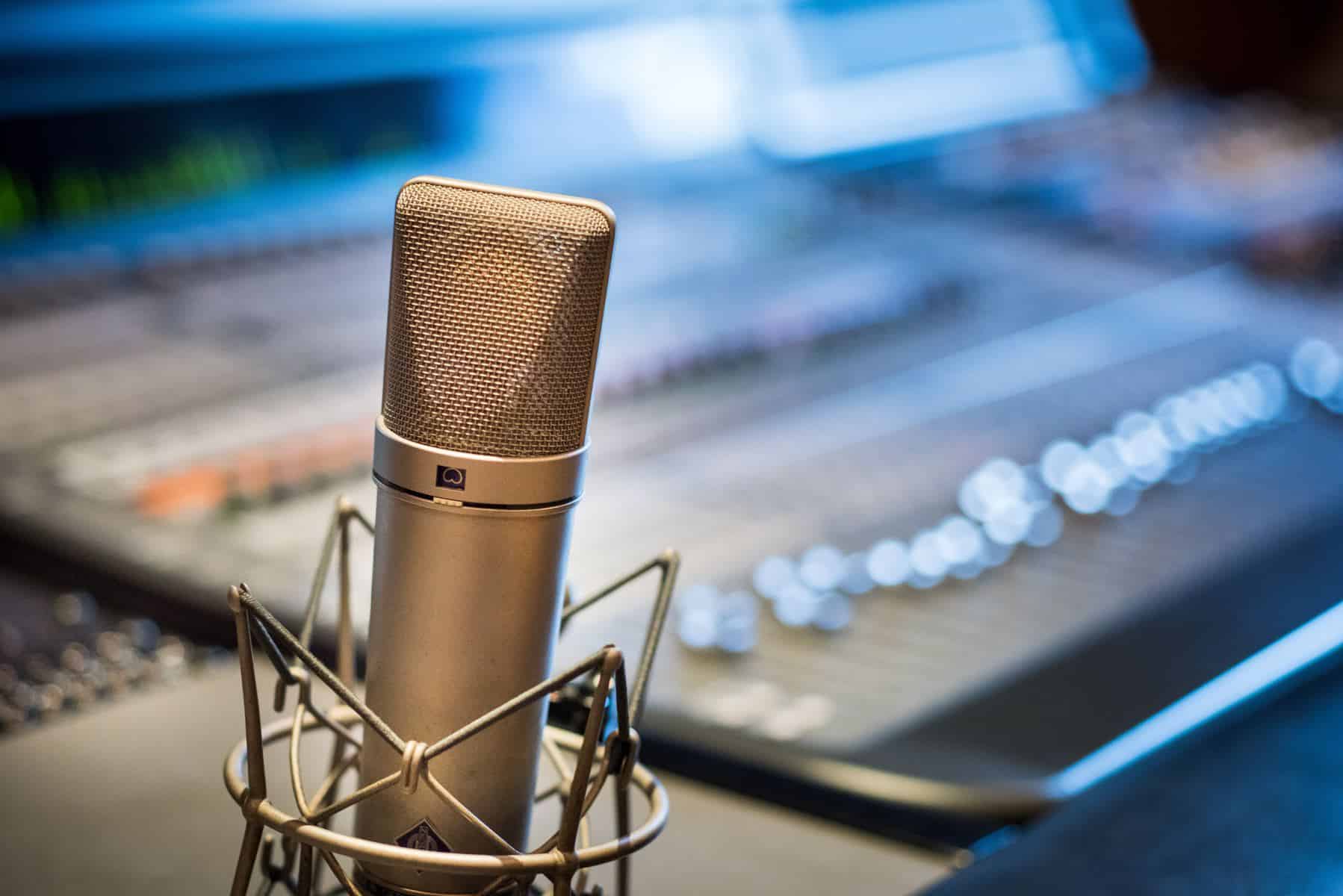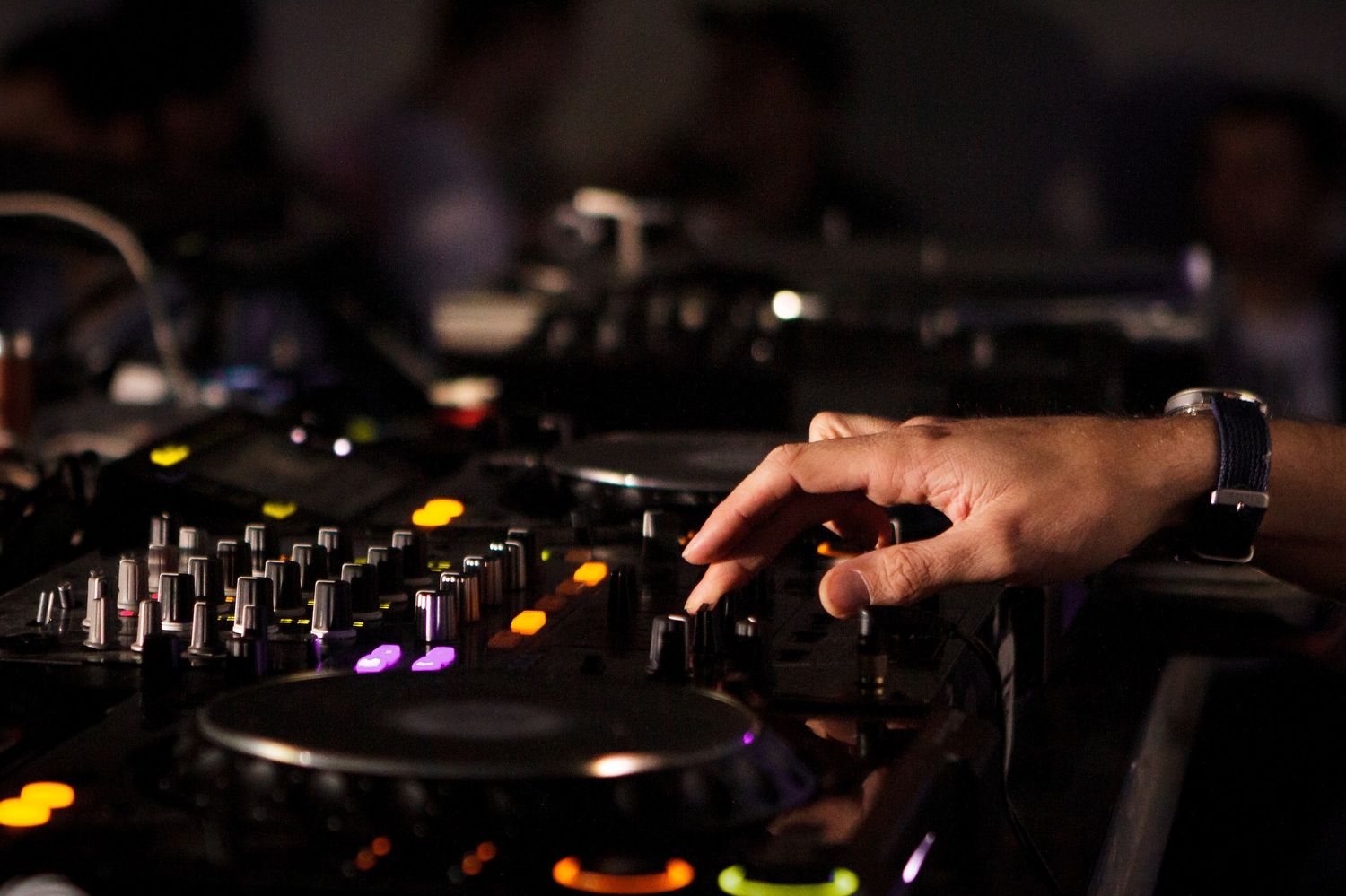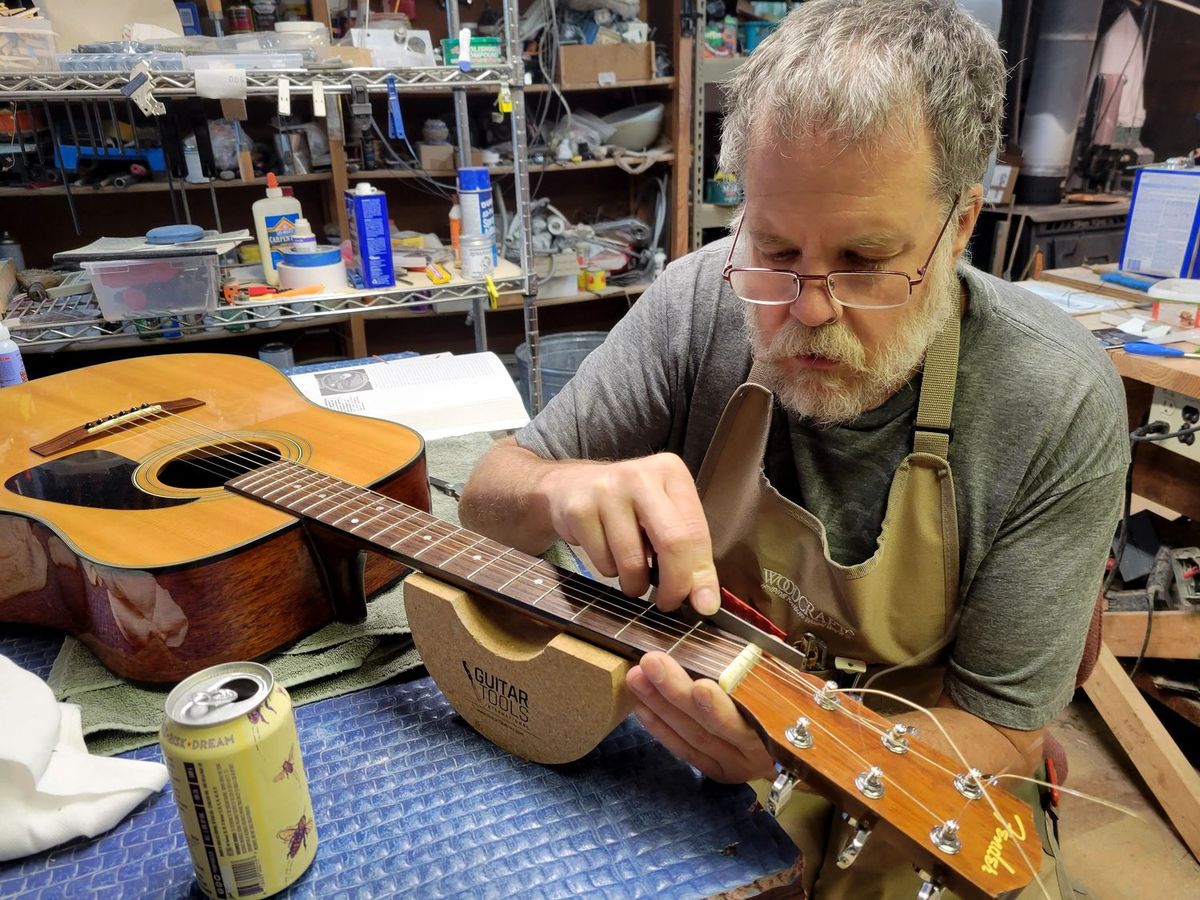Home>Production & Technology>Musician>How To Become A Professional Musician


Musician
How To Become A Professional Musician
Modified: January 28, 2024
Learn how to become a professional musician and master the art of music with our comprehensive guide. Unlock your potential as a skilled musician and achieve success in the music industry.
(Many of the links in this article redirect to a specific reviewed product. Your purchase of these products through affiliate links helps to generate commission for AudioLover.com, at no extra cost. Learn more)
Table of Contents
- Introduction
- Steps to Becoming a Professional Musician
- Develop Musical Talent and Skills
- Choose an Instrument or Vocal Focus
- Take Formal Music Lessons
- Practice Regularly and Consistently
- Join School or Community Music Programs
- Participate in Competitions and Auditions
- Build a Diverse Musical Repertoire
- Collaborate with Other Musicians
- Gain Performance Experience
- Take Advantage of Music Networking Opportunities
- Create a Professional Musician Image
- Pursue Music Education and Further Training
- Promote Yourself and Your Music
- Seek Professional Music Management or Representation
- Stay Committed, Persistent, and Passionate
- Conclusion
Introduction
Becoming a professional musician is a dream shared by many music enthusiasts. The combination of creativity, passion, and skill creates a unique and fulfilling career path. Whether you aspire to perform on the big stages, compose music for film and television, or teach others to play an instrument, the journey towards becoming a professional musician requires dedication, perseverance, and a strong musical foundation.
In this article, we will explore the steps to becoming a professional musician. From developing your talent and skills to promoting your music and seeking representation, we will guide you through the process of transforming your passion for music into a successful career. Whether you are just starting out or looking to take your musical journey to the next level, this guide will provide you with the knowledge and insights you need to succeed.
While the path to becoming a professional musician can be challenging, it is also incredibly rewarding. As you hone your craft, collaborate with fellow musicians, and perform in front of audiences, you will experience the joy and fulfillment that comes with pursuing your passion. So, let’s dive in and discover the steps you can take to turn your musical dreams into reality.
Steps to Becoming a Professional Musician
Becoming a professional musician involves a series of steps that will help you build a strong foundation, gain experience, and establish yourself in the music industry. From developing your musical talent to promoting yourself and seeking opportunities, here are the essential steps to consider:
- Develop Musical Talent and Skills: Every great musician starts with raw talent. Whether you have natural musical abilities or not, it is essential to develop your skills through dedicated practice, learning music theory, and studying different musical genres.
- Choose an Instrument or Vocal Focus: Select an instrument or decide whether you want to focus on vocals. Choose the one that resonates with you the most and allows you to express your musicality.
- Take Formal Music Lessons: Enroll in formal music lessons to learn from experienced instructors who can guide you and help you refine your technique and musicianship.
- Practice Regularly and Consistently: Dedicate regular time to practice your instrument or voice. Consistency is key to improving your skills and mastering your craft.
- Join School or Community Music Programs: Participate in school or community music programs as they provide valuable opportunities to perform with others and grow as a musician.
- Participate in Competitions and Auditions: Enter music competitions or audition for bands, orchestras, or music schools to challenge yourself and gain exposure.
- Build a Diverse Musical Repertoire: Expand your musical repertoire by learning different styles and genres. This versatility will enhance your skills and make you more marketable as a musician.
- Collaborate with Other Musicians: Seek opportunities to collaborate with other musicians. Join bands or ensembles to learn from each other and create musical synergy.
- Gain Performance Experience: Perform in front of live audiences whenever and wherever possible. Whether it’s small gigs, open mic nights, or local events, performing regularly will help build your stage presence and confidence.
- Take Advantage of Music Networking Opportunities: Attend music conferences, industry events, and workshops to connect with other musicians, industry professionals, and potential collaborators.
- Create a Professional Musician Image: Develop a brand for yourself as a musician. Perfect your stage presence, create a professional online presence, and curate your image to attract the attention of fans and industry professionals.
- Pursue Music Education and Further Training: Consider pursuing a formal music education or taking advanced training to gain deeper knowledge and skills in your chosen field.
- Promote Yourself and Your Music: Utilize social media, music platforms, and other marketing channels to promote your music and connect with your audience. Build a following and engage with your fans.
- Seek Professional Music Management or Representation: Once you have established yourself and achieved a certain level of success, consider seeking professional music management or representation to help you navigate the industry, secure gigs, and negotiate contracts.
- Stay Committed, Persistent, and Passionate: Finally, remain committed to your musical journey. Embrace challenges, stay persistent, and never lose sight of your passion for music. Success as a professional musician often comes to those who persevere.
By following these steps, you will be well on your way to becoming a professional musician. Remember, this journey takes time, dedication, and patience. Embrace the process, continuously improve your skills, and always stay true to your unique artistic voice.
Develop Musical Talent and Skills
Developing your musical talent and skills is the foundation of becoming a professional musician. Whether you have natural musical abilities or not, there are several ways you can nurture and enhance your talent:
- Start with the Basics: Familiarize yourself with the fundamentals of music theory, including scales, chords, and rhythm. Understanding these concepts will provide a solid framework for your musical journey.
- Practice Regularly: Dedicate consistent time to practice your instrument or voice. Regular practice allows you to refine your techniques, build muscle memory, and improve your overall musicianship.
- Learn from Others: Seek guidance from experienced musicians or music instructors. Take advantage of their knowledge and expertise to gain insights and improve your skills.
- Study Different Genres: Explore a variety of musical genres and styles. This exposure will expand your musical vocabulary and help you develop a versatile and unique sound.
- Experiment and Explore: Don’t be afraid to experiment with different techniques or approaches to music. Embrace creativity and explore new horizons to develop your own unique musical style.
- Listen to Different Artists: Immerse yourself in the music of various artists across different genres. Listening to a wide range of music will expose you to different styles and inspire you to explore new possibilities.
- Take Advantage of Online Resources: The internet offers a wealth of resources for aspiring musicians. Take advantage of online tutorials, courses, and forums to learn new skills and stay updated with the latest trends and techniques.
- Attend Workshops and Masterclasses: Look for workshops and masterclasses conducted by renowned musicians. These events provide valuable opportunities to learn from industry professionals and gain insights into their creative processes.
Remember, developing your musical talent and skills is an ongoing process. Stay committed to honing your craft and embrace a growth mindset. With time and dedication, you will see significant progress in your musical abilities, setting the stage for a successful career as a professional musician.
Choose an Instrument or Vocal Focus
When embarking on the journey to become a professional musician, one of the first decisions you’ll need to make is choosing an instrument or deciding to focus on vocals. This choice will shape your musical identity and the direction of your career. Here are some factors to consider when making this important decision:
- Passion and Interest: Consider what instrument or vocal style excites you the most. It’s crucial to choose something that you are passionate about and genuinely enjoy playing or singing.
- Strengths and Natural Abilities: Reflect on your natural abilities and strengths. Some individuals may have a natural inclination towards certain instruments or voice types, making it easier for them to excel and connect with the music.
- Market Demand: Research the market demand for different instruments and vocal styles. Consider which options are in high demand and have more opportunities for performances and collaborations.
- Long-Term Commitment: Assess your willingness to commit to learning and mastering a particular instrument or vocal technique. Becoming proficient on a musical instrument or developing strong vocal skills requires consistent practice and dedication.
- Personal Expression: Think about the instrument or vocal style that allows you to express yourself and connect emotionally with the music. Your chosen instrument should resonate with your artistic voice and convey your musical message effectively.
- Collaboration Potential: Consider how the chosen instrument or vocal style will harmonize with other instruments and voices. Collaboration is a vital aspect of being a musician, and choosing an instrument that complements others can open up more opportunities for collaboration.
- Versatility: Think about the versatility of the instrument or vocal style. Some instruments offer a broad range of genres and styles to explore, while others may have a more limited scope.
- Availability and Accessibility: Consider the availability and accessibility of resources for learning and practicing your chosen instrument or vocal style. Check if there are local music schools, teachers, or community programs that can support your musical journey.
Ultimately, the decision of choosing an instrument or vocal focus should align with your passion, strengths, and long-term goals as a musician. Remember that learning an instrument or developing vocal skills is a lifelong journey, so choose something that you can grow and evolve with as you progress on your path to becoming a professional musician.
Take Formal Music Lessons
Formal music lessons play a crucial role in developing your skills and mastering your instrument or voice. While self-study and online resources are valuable, formal music lessons offer structured instruction and guidance from experienced teachers. Here are some key benefits of taking formal music lessons:
- Expert Guidance: Music instructors have in-depth knowledge of their respective instruments or vocal techniques. They can provide you with expert guidance, helping you develop proper technique, posture, and musicality.
- Structured Learning: Formal music lessons provide a structured learning environment. Lessons are organized systematically, gradually building on your skills and knowledge, ensuring a well-rounded musical education.
- Customized Curriculum: A music teacher can tailor the curriculum to your specific needs and goals. Whether you want to focus on classical music, jazz, or a particular genre, they can create a personalized learning plan.
- Immediate Feedback: In a music lesson, your teacher can provide immediate feedback on your performance. They can identify areas for improvement, correct mistakes, and guide you on how to refine your technique.
- Accountability and Motivation: Regular music lessons create a sense of accountability. Knowing that you have lessons scheduled motivates you to practice consistently and stay dedicated to your musical development.
- Peer Interaction: In a music school or studio, you have the opportunity to interact with fellow musicians. Collaborating with peers, participating in ensemble performances, and sharing musical insights can enhance your growth as a musician.
- Exposure to Different Styles and Techniques: A music teacher can introduce you to various musical styles and techniques. This exposure can broaden your musical horizons and inspire you to explore new genres.
- Performance Opportunities: Many music schools and studios offer performance opportunities such as recitals or concerts. These occasions allow you to showcase your skills and gain valuable stage experience.
- Building a Strong Foundation: Formal music lessons lay the foundation for your musical journey. They ensure that you learn the proper fundamentals, technique, and theory, providing a solid base upon which you can continue to grow and excel.
When selecting a music teacher or school, consider their qualifications, teaching style, and expertise in the particular instrument or vocal technique you are interested in. Take the time to discuss your goals and expectations to ensure a good fit.
Remember, formal music lessons are an investment in your musical development. Embrace the opportunity to learn from experienced professionals, and be open to their guidance and feedback. With regular lessons and consistent practice, you’ll be well on your way to becoming a skilled and accomplished musician.
Practice Regularly and Consistently
Regular and consistent practice is essential in becoming a professional musician. It is through practice that you refine your skills, improve your technique, and develop a deep understanding of your instrument or voice. Here are some key points to consider when establishing a practice routine:
- Set a Schedule: Establish a regular practice schedule that fits into your daily routine. Consistency is key, so aim for dedicated practice sessions at the same time each day or week.
- Start with Warm-up Exercises: Warm up before each practice session to prepare your muscles and vocal cords. This helps prevent injuries and improves your performance.
- Focus on Technique: Allocate specific practice time to focus on technical exercises that improve your dexterity, control, and precision. This could include scales, arpeggios, breathing exercises, or vocal warm-ups.
- Practice Repertoire: Spend time working on the songs, pieces, or compositions that you are currently learning. Break them down into smaller sections and practice them gradually, focusing on difficult passages or techniques.
- Set Goals and Tracking Progress: Establish clear goals for each practice session and track your progress. This helps motivate you and gives you a sense of achievement as you reach milestones along your musical journey.
- Vary Your Practice: Practice different aspects of music, such as rhythm, sight-reading, ear training, improvisation, and music theory. This helps you develop a well-rounded understanding of music and strengthens different areas of your musicianship.
- Record and Evaluate: Record yourself during practice sessions and listen to the recordings. This allows you to objectively assess your performance, identify areas for improvement, and track your progress over time.
- Stay Focused and Present: During practice, eliminate distractions and fully immerse yourself in the music. Concentrate on the nuances of your performance, paying attention to dynamics, phrasing, articulation, and expression.
- Seek Feedback: Occasionally, seek feedback from your music teacher, fellow musicians, or mentors. Their insights can provide valuable perspectives and help you refine your skills.
- Practice Mindfully: Practice with intention and mindfulness. Rather than mindlessly going through the motions, engage your mind and body fully in the practice session. Be present and attentive to each note, rhythm, and technique you play.
- Embrace Slow Practice: Slow practice allows you to focus on accuracy, technique, and musicality. Break down complex passages and practice at a tempo that allows you to play flawlessly, gradually increasing the speed as you improve.
Remember, the quality of your practice is just as important as the quantity. Aim for focused and efficient practice sessions rather than long hours of mindless repetition. By practicing regularly, staying disciplined, and maintaining a growth mindset, you will witness significant progress in your musical abilities and move closer to your goal of becoming a professional musician.
Join School or Community Music Programs
Joining school or community music programs can be a valuable step towards becoming a professional musician. These programs provide a supportive and collaborative environment where you can enhance your skills, gain performance experience, and connect with fellow musicians. Here are some benefits of joining such programs:
- Access to Qualified Instructors: School and community music programs often have experienced instructors who can provide guidance, mentorship, and valuable feedback on your musical journey.
- Structured Learning: These programs offer a structured curriculum that covers a wide range of musical concepts and techniques. You will receive comprehensive training that prepares you for a professional career in music.
- Performance Opportunities: School and community music programs frequently organize concerts, recitals, and competitions, providing you with opportunities to showcase your talent and gain valuable performance experience.
- Collaborative Environment: By joining these programs, you have the chance to collaborate with other musicians, play in ensembles, and learn the art of musical collaboration. This helps you develop essential teamwork and communication skills.
- Musical Exposure: These programs expose you to various musical genres, styles, and traditions. You will have the opportunity to explore and appreciate a diverse range of musical expressions beyond your own specialization.
- Networking Opportunities: By interacting with fellow musicians, instructors, and industry professionals in school or community music programs, you can expand your network and forge connections that may lead to future collaborations or career opportunities.
- Community Support: In school and community settings, you may find a supportive network of music enthusiasts who share your passion. This community can provide encouragement, inspiration, and a sense of belonging.
- Growth and Motivation: Being a part of a music program can fuel your motivation and drive. Engaging with others who are also on their musical journey can push you to strive for continuous improvement and reach new heights.
- Mentorship Opportunities: Within these programs, you may have the chance to mentor younger or less experienced musicians. Sharing your knowledge and experiences not only helps others but solidifies your own understanding and mastery of the music.
- Access to Resources: School and community music programs often provide access to resources such as practice spaces, rehearsal rooms, libraries, and sometimes even instruments and equipment.
Whether you join a school music program, a local community orchestra, a jazz band, or a choir, the experience of participating in these programs can significantly enhance your musical skills, build your confidence, and broaden your musical horizons. Embrace these opportunities to grow as a musician and immerse yourself in the vibrant world of music.
Participate in Competitions and Auditions
Participating in competitions and auditions is a valuable way to gain exposure, receive feedback, and showcase your talents as a musician. These opportunities allow you to measure your skills against other performers, gain valuable performance experience, and open doors to new opportunities. Here are some reasons why participating in competitions and auditions is beneficial:
- Evaluation and Feedback: Competitions and auditions provide a platform for professional evaluation of your skills. The feedback you receive can help you identify areas for improvement, refine your performance, and grow as a musician.
- Performance Experience: Competing or auditioning in front of an audience and a panel of judges helps build your confidence and stage presence. The more you put yourself out there, the more comfortable you become with performing under pressure.
- Exposure and Recognition: Competitions and auditions offer the opportunity to gain exposure and recognition within the music community. Winning or placing well in a competition can boost your reputation and open doors to performance and collaboration opportunities.
- Networking Opportunities: Competitions and auditions often bring together musicians, industry professionals, and music enthusiasts. Engaging with these individuals creates networking opportunities that can lead to valuable connections and future collaborations.
- Pushing Your Limits: Participating in competitions and auditions pushes you to strive for excellence and reach new levels of performance. It challenges you to step out of your comfort zone, elevate your skills, and surpass your own expectations.
- Setting Goals: Competitions and auditions provide tangible goals to work towards. They give you a clear target and motivate you to focus your practice and preparation, intensifying your dedication to achieving your musical aspirations.
- Learning from Others: Competitions and auditions expose you to a diverse range of performers and styles. Observe and learn from fellow contestants and gain inspiration from their interpretations and techniques.
- Building Resilience: The competitive nature of these events helps you develop resilience and perseverance. It teaches you how to handle disappointments, learn from failures, and bounce back stronger.
- Discovering Areas for Growth: Competitions and auditions can reveal areas of improvement that you may have overlooked. The feedback and critiques you receive can guide you towards focused practice and further development in specific aspects of your performance.
- Boosting Confidence: Successfully participating in competitions and auditions can enhance your confidence as a musician. It validates the effort you have put into your craft and reinforces your belief in your abilities.
When participating in competitions and auditions, it’s important to approach them with a growth mindset. Learn from every experience, whether you win or not, and use it as fuel to continue improving and evolving as a musician. Embrace these opportunities as stepping stones towards your goal of becoming a professional musician.
Build a Diverse Musical Repertoire
Building a diverse musical repertoire is crucial for a professional musician. A varied repertoire not only showcases your versatility but also enables you to connect with a wider audience and explore different musical styles and genres. Here are some reasons why building a diverse musical repertoire is important:
- Versatility: Having a diverse repertoire allows you to adapt to different performance settings and cater to various audience preferences. It demonstrates your ability to engage with a wide range of musical styles, enhancing your marketability as a musician.
- Expanding Musical Horizons: Exploring different musical genres exposes you to new techniques, rhythms, and cultural influences. It broadens your musical horizons and encourages creative expression by incorporating elements from various styles into your own unique sound.
- Flexibility in Collaborations: A diverse repertoire offers opportunities for collaboration with musicians from different backgrounds. It enables you to play alongside artists specializing in different genres, enhancing your collaborative abilities and fostering musical growth.
- Appealing to a Wider Audience: By including songs from different genres, you can attract a broader audience. This widens your reach and increases the likelihood of connecting with listeners who appreciate various musical styles. It also expands opportunities for gigs and performances.
- Enhancing Performance Skills: Learning and performing a diverse range of songs challenges and improves your technical abilities, interpretation skills, and stage presence. Each style demands different techniques, emotions, and nuances, contributing to your growth as a well-rounded performer.
- Professional Adaptability: A diverse repertoire prepares you for a wide range of professional opportunities, including studio sessions, live performances, teaching, and session work. Being versatile and able to adapt to different musical contexts is highly valued in the music industry.
- Expressing Your Artistic Identity: A diverse repertoire allows you to express your unique artistic identity through a variety of musical lenses. You can incorporate your own interpretations and personal flair into different songs, creating an engaging and individualistic musical experience for your audience.
- Captivating and Engaging Audiences: When performing a diverse repertoire, you can tailor your setlist to suit the audience or venue. This can keep audiences captivated, engaged, and excited throughout your performance, resulting in a memorable and impactful musical experience.
As you build your musical repertoire, focus on selecting songs that resonate with you personally and align with your artistic vision. Aim for a balance between popular and lesser-known pieces, iconic classics, and contemporary works. Continuously expand your repertoire by exploring new songs, genres, and artists, being open to experimentation and discovery.
A diverse musical repertoire is a valuable asset in your journey towards becoming a professional musician. It sets you apart, showcases your range as an artist, and opens doors to a multitude of exciting musical opportunities.
Collaborate with Other Musicians
Collaboration with other musicians is an essential aspect of growth and success in the music industry. Through collaboration, you can expand your musical horizons, learn from others, and create unique and dynamic musical experiences. Here are some reasons why collaborating with other musicians is beneficial:
- Musical Synergy: Collaboration allows the blending of different musical styles, ideas, and techniques. By working with other musicians, you can create synergistic performances that showcase the strengths of each individual while creating a harmonious and memorable musical experience.
- Learning from Each Other: Collaborating with other musicians provides an opportunity to learn from their expertise and experiences. Each musician brings their unique perspective, knowledge, and skills to the table, fostering growth and inspiring new ideas.
- Expanding Creativity: Collaborating with other musicians encourages exploration and versatility. It pushes you to step outside your comfort zone and try new musical approaches, leading to fresh and innovative ideas that can elevate your music to new heights.
- Building Networking Connections: Collaboration often leads to networking connections within the music industry. Working with other musicians introduces you to their contacts, expanding your professional network and opening doors to potential future opportunities.
- Broadening Musical Influence: Collaborating with musicians from different backgrounds and genres exposes you to new musical influences. This exposure helps you broaden your musical palette, enabling you to incorporate diverse elements and create a distinctive and authentic artistic voice.
- Sharing Resources and Skills: Collaboration allows for the sharing of resources, including rehearsal spaces, equipment, and knowledge. Through shared resources, you can access a wider range of tools and opportunities, enhancing your artistic development.
- Strengthening Performance Skills: Collaborative performances challenge your adaptability and communication skills as a musician. They teach you how to listen, respond, and blend with other musicians in real-time, improving your overall stage presence and musicality.
- Expanding Fanbase: Collaborating with other musicians can introduce your music to new audiences. By pooling your fanbases, you can cross-promote each other’s work, reaching a broader audience and potentially gaining new fans.
- Creating Lasting Musical Connections: Collaborations often create meaningful and lasting musical connections. These connections can lead to ongoing creative partnerships, joint projects, and shared experiences that can shape your musical journey.
To collaborate effectively, communication, respect, and openness are key. Clearly define roles, expectations, and goals from the beginning of the collaboration to ensure a smooth and harmonious working process. Embrace the diversity of ideas and perspectives, valuing the contributions of each collaborator.
Remember, collaboration is a two-way street. Be willing to contribute your skills, knowledge, and creativity to the project while keeping an open mind to the suggestions and input of your collaborators. Through effective collaboration, you can create musical magic that transcends what any individual musician can achieve alone.
Gain Performance Experience
Gaining performance experience is a crucial step in becoming a professional musician. The more you perform in front of live audiences, the more you develop your stage presence, connect with listeners, and refine your craft. Here are some reasons why gaining performance experience is essential:
- Building Confidence: Performing regularly helps build your confidence as a musician. Each time you step onto the stage, you become more comfortable with the spotlight, which translates to a more engaging and captivating performance.
- Refining Stage Presence: Performing in front of an audience allows you to develop your stage presence. You learn how to engage with the crowd, control your body language, and communicate your musical message effectively.
- Testing Your Skills: Live performances challenge and test your musical abilities under real-time pressure. This experience exposes areas for improvement, helps refine your technique, and allows you to grow as a performer.
- Connecting with Your Audience: Performing live provides a unique opportunity to connect with your audience on a deeper level. The energy exchange between performer and listener creates a profound connection and fosters a sense of shared musical experience.
- Feedback and Adaptability: Live performances expose you to immediate feedback from the audience. This feedback helps you gauge the audience’s response, adapt your performance in real-time, and make necessary adjustments to enhance future performances.
- Sharpening Musical Interpretation: Each performance allows you to refine your musical interpretations and bring a fresh perspective to your repertoire. Performing in different settings and for diverse audiences helps you discover new nuances and expressivity in your music.
- Developing Performance Stamina: Regular performances build your endurance and stamina as a musician. This prepares you for longer concerts, touring, and extended periods of playing or singing without fatigue.
- Creating Memorable Experiences: Live performances leave a lasting impact on both the performer and the audience. They create memorable moments and emotional connections that form a strong bond between you and your fans.
- Networking Opportunities: Performing live exposes you to potential networking opportunities within the industry. Industry professionals, fellow musicians, and music enthusiasts in the audience may take notice of your talent and offer collaboration, recording, or other performance opportunities.
- Gaining Industry Recognition: Consistent live performances can lead to industry recognition and accolades. Festivals, competitions, and industry showcases often provide a platform to showcase your talent to industry insiders and decision-makers.
Seek opportunities to perform wherever possible, whether it’s at local venues, open mic nights, community events, or music festivals. Consider reaching out to event organizers, collaborating with other musicians, or even organizing your own intimate performances. Every live performance experience will contribute to your growth as a musician and help you establish yourself in the industry.
Remember, each live performance is a chance to connect with your audience, grow as a performer, and share your musical passion. Embrace the stage, cherish these experiences, and let your love of music shine through in every performance.
Take Advantage of Music Networking Opportunities
Networking is a key component of building a successful career in the music industry. By connecting with other musicians, industry professionals, and music enthusiasts, you can open doors to collaborations, performance opportunities, and valuable industry insights. Here are some ways to take advantage of music networking opportunities:
- Attend Music Conferences and Workshops: Music conferences and workshops bring together musicians, industry experts, and like-minded individuals. These events provide opportunities to learn from professionals, attend informative sessions, and network with industry insiders.
- Join Music Associations and Organizations: Become a member of music associations and organizations in your area. These groups often offer networking events, workshops, and resources that can expand your professional network and provide support in your music career.
- Engage in Online Music Communities: Participate in online music communities and forums. Connect with other musicians, share your work, and contribute to discussions. These platforms can provide valuable connections and insights from a diverse range of music professionals.
- Collaborate with Fellow Musicians: Actively seek collaboration opportunities with other musicians. By working with different artists, you not only expand your musical horizons but also tap into their network and fanbase, creating new opportunities for your music.
- Utilize Social Media Platforms: Engage with your followers and fellow musicians on social media platforms. Interact with them, share your music, and collaborate on virtual projects. Social media provides a powerful tool for networking and connecting with a global community of music enthusiasts.
- Attend Local Music Events and Gigs: Support the local music scene by attending live gigs, concerts, and open mic nights. Engage in conversations with fellow musicians and audience members. These events provide a more personal and approachable environment for networking.
- Reach Out to Industry Professionals: Don’t be afraid to contact industry professionals such as managers, promoters, record label representatives, and music journalists. Introduce yourself, share your music, and express your interest in collaborating or seeking advice. Personalized and targeted communication can lead to meaningful connections.
- Connect with Music Educators: Music educators, such as teachers and professors, can be valuable mentors and connectors. They often have extensive networks and can provide guidance or introduce you to relevant industry professionals.
- Volunteer or Collaborate with Non-Profit Organizations: Offer your talents and services to non-profit organizations that promote music. Volunteering or collaborating with such organizations not only allows you to contribute to a cause you believe in but also provides opportunities to network with other musicians and industry professionals who share similar interests.
- Attend Music Festivals and Showcases: Music festivals and showcases attract a diverse range of industry professionals, from agents to producers. Take advantage of these events to showcase your music, attend industry panels, and engage in casual conversations with like-minded individuals.
Remember, networking is about building genuine relationships and nurturing connections over time. Approach networking with a positive attitude, willingness to help others, and an open mind to new opportunities. Cultivate your relationships and maintain contact with the people you meet along your journey.
By actively participating in music networking opportunities, you expand your professional network, stay informed about industry trends, and increase your chances of finding new opportunities that can propel your music career forward.
Create a Professional Musician Image
Creating a professional musician image is essential for establishing your brand and gaining recognition in the music industry. It involves crafting your visual identity, cultivating a unique style, and showcasing professionalism in all aspects of your career. Here are some key elements to consider when creating a professional musician image:
- Visual Identity: Develop a visual identity that reflects your music and personality. This includes choosing an appropriate artist name, designing a memorable logo, and creating visually appealing promotional materials such as album artwork, website, and social media graphics.
- Consistent Branding: Maintain consistency across all your promotional materials to reinforce your professional musician image. Use consistent colors, fonts, and imagery that align with your music genre and target audience.
- Stage Presence: Pay attention to your stage presence, including your attire, grooming, and overall presentation. Dress appropriately for each performance, ensuring your appearance complements your music and resonates with your audience.
- Professional Online Presence: Take your online presence seriously. Maintain active and engaging social media profiles, update your website regularly, and showcase high-quality content that represents your musical style and values.
- Engaging Performance Skills: Enhance your live performance skills to captivate your audience. Focus on stage movements, crowd interaction, and conveying emotion through your music. A compelling and authentic stage presence is crucial for leaving a lasting impression.
- Authenticity: Stay true to yourself and your artistic vision. Developing a professional musician image doesn’t mean compromising your authenticity. Embrace your unique qualities and let them shine through in your music, style, and interactions with fans.
- Prompt Communication: Be responsive and professional in your communications. Promptly reply to messages, emails, and inquiries from fans, industry professionals, and potential collaborators. Cultivating a reputation for reliable and timely communication will enhance your professional image.
- Ethical Conduct: Uphold ethical standards and professionalism in your interactions with others. Treat fellow musicians, industry professionals, and fans with respect and integrity. Building a reputation for ethical conduct will enhance your credibility as a professional musician.
- Quality Recordings: Ensure the quality of your recordings is professional. Investing in high-quality production, mastering, and mixing will elevate your sound and leave a lasting impression on listeners and industry professionals.
- Collaborations with Established Artists: Collaborating with established artists can enhance your professional image. Seek opportunities to collaborate with respected musicians, producers, or songwriters. Their association can lend credibility and open doors to new audiences and industry connections.
- Continual Development: Dedicate yourself to continual growth and improvement as a musician. Keep honing your skills, exploring new musical avenues, attending workshops, and seeking feedback to evolve and keep your professional image relevant and fresh.
Remember, your professional musician image is a reflection of your musical identity and the values you stand for. It’s what sets you apart from the crowd and allows you to make a lasting impression on your audience and industry professionals. Put effort into shaping your image and ensure it aligns with your music and career goals.
Crafting a professional musician image takes time and deliberate effort, but with consistency and authenticity, it can solidify your presence in the music industry and establish you as a reputable and respected artist.
Pursue Music Education and Further Training
Pursuing music education and further training is a valuable step towards becoming a professional musician. While natural talent and passion are important, formal education provides you with a solid foundation, deepens your musical knowledge, and hones your skills. Here’s why music education and further training are beneficial:
- Technical Proficiency: Formal music education helps you develop technical proficiency on your chosen instrument or with your vocals. It provides structured instruction and guidance, teaching you proper techniques, music theory, sight-reading, and ear training.
- Expanding Musical Horizons: Music education exposes you to a wide range of musical styles, genres, composers, and historical periods. This exposure broadens your musical horizons, enhances your understanding of music, and influences your own creative expression.
- Performance Opportunities: Educational institutions often provide performance opportunities through ensembles, recitals, and concerts. These experiences allow you to refine your performance skills, gain confidence, and receive constructive feedback from instructors and peers.
- Musical Theory and Analysis: Formal education covers music theory and analysis, which deepens your understanding of musical structures, harmony, and composition. This knowledge enhances your ability to interpret and perform music with greater depth and understanding.
- Networking and Collaboration: Music education programs facilitate networking and collaboration with fellow musicians. Connecting with like-minded individuals can lead to valuable collaborations, joint projects, and lifelong musical connections.
- Teaching and Mentoring Opportunities: Music education not only prepares you to be a performer but also equips you with the skills to teach and mentor others. Sharing your knowledge and passion with aspiring musicians can become a fulfilling aspect of your career.
- Access to Resources and Facilities: Educational institutions provide access to resources such as libraries, practice rooms, recording studios, and musical instruments. These resources can support your musical growth and development.
- Exposure to Experts in the Field: Music education programs often have experienced faculty who are experts in their respective fields. Learning from these instructors provides invaluable insights, mentorship, and guidance for your musical journey.
- Recognition and Credentials: Completing a music education program or pursuing further training can provide you with recognized credentials. These credentials can enhance your credibility as a musician and open doors to career opportunities.
- Continual Growth and Learning: Education is an ongoing process, and pursuing music education allows you to continually grow and develop as a musician. Whether through formal education or workshops and masterclasses, ongoing training keeps your skills sharp and relevant.
It’s important to choose the right music education program or training that aligns with your goals, interests, and musical style. Research institutions, faculty members, curriculum offerings, and alumni success to find a program that suits your needs.
Remember, while formal education is valuable, it is not the sole path to becoming a professional musician. Many successful musicians have achieved their goals through a combination of formal education, real-world experience, and self-guided learning. Ultimately, the pursuit of music education and further training is a personal choice that depends on your individual aspirations and circumstances.
Promote Yourself and Your Music
Promoting yourself and your music is crucial for gaining visibility, attracting new fans, and creating opportunities in the music industry. While talent is important, successful musicians understand the importance of effective self-promotion. Here are some key strategies to promote yourself and your music:
- Create a Professional Online Presence: Build a professional website and engage with social media platforms to showcase your music, share updates, and connect with your audience. Use compelling visuals, well-written bios, and high-quality content to leave a lasting impression.
- Release Music Regularly: Regularly release new music to keep your audience engaged and continuously grow your fanbase. Consider singles, EPs, or albums, depending on your strategy and resources.
- Collaborate with Influencers and other Artists: Collaborations with influencers, established artists, or producers can help expand your reach to new audiences. Work together on projects, cross-promote each other’s music, or feature on each other’s tracks to tap into their existing fanbase.
- Utilize Streaming Platforms and Online Music Stores: Distribute your music on popular streaming platforms and online music stores. Make it easy for fans to find and access your music across different platforms.
- Create Engaging Content: Share behind-the-scenes videos, exclusive content, or live performances to give your audience a deeper connection to your music and your journey as an artist.
- Engage with Your Fans: Respond to comments, messages, and emails from your fans promptly. Engage in discussions, show gratitude for their support, and make them feel involved in your musical journey.
- Submit Your Music to Bloggers and Playlist Curators: Reach out to music bloggers and playlist curators who align with your style and genre. Submit your music for potential features, reviews, or playlist placements.
- Perform Live Whenever Possible: Organize your own shows or collaborate with promoters and venues to secure live performance opportunities. Concerts, festivals, and local gigs provide excellent platforms to showcase your talent and connect with new fans.
- Participate in Music Competitions and Showcases: Compete in music competitions and participate in showcases to gain exposure among industry professionals and potentially win accolades that bolster your credibility.
- Create Compelling Press Materials: Develop a press kit with professionally written artist biographies, press releases, high-resolution photos, and links to your music. This makes it easy for media outlets, promoters, and industry professionals to feature you.
- Network with Industry Professionals: Attend industry events, music conferences, and networking functions to connect with industry professionals. Exchange contact information, build relationships, and seek opportunities to collaborate or gain valuable industry insights.
- Utilize Online Advertising and Promotion: Explore digital advertising options to target specific audiences and enhance your online presence. Utilize platforms like social media advertising, Google Ads, or music-focused online publications to reach new listeners.
Remember, effective promotion requires a consistent and intentional effort. Be authentic, genuine, and strategic in your approach. Experiment with different methods to find what works best for you and consistently evaluate and refine your promotional strategies.
By actively promoting yourself and your music, you can increase your visibility, attract new fans, and create opportunities that propel your musical career forward.
Seek Professional Music Management or Representation
Seeking professional music management or representation is an important step toward building a successful and sustainable career as a musician. Music managers and agents can provide valuable guidance, negotiate contracts, and open doors to new opportunities. Here are some reasons why you should consider seeking professional music management or representation:
- Industry Expertise: Music managers and agents possess in-depth knowledge and connections within the music industry. They understand the intricacies of the business, including navigating contracts, securing bookings, and maximizing revenue streams.
- Strategic Career Planning: Professional representation can help you develop a long-term career strategy. They can provide guidance in areas such as selecting the right opportunities, building a strong brand, and developing a sustainable career path.
- Networking and Industry Access: Music managers and agents have established relationships with industry professionals, including record labels, promoters, and other musicians. This network can help you gain exposure, secure collaborations, and access new markets.
- Negotiation and Contract Support: Professionals in music management and representation can negotiate contracts on your behalf, ensuring that you receive fair compensation and favorable terms. They have the expertise to navigate contractual intricacies and protect your best interests.
- Time and Resource Optimization: Music managers and agents can handle administrative tasks, such as booking gigs, managing finances, and handling logistics. This allows you to focus more on your music and creative endeavors while professionals handle the business side of your career.
- Industry Insights and Trends: Music management professionals stay abreast of industry insights, trends, and emerging opportunities. Their knowledge can help you stay relevant, adapt to changes in the industry, and capitalize on new avenues for growth.
- Professional Development: Music managers and agents often provide valuable guidance for your professional development. They may recommend additional training, workshops, or collaborations that can enhance your skills and broaden your musical horizons.
- Brand Development and Marketing: Professionals in music management can assist with refining your brand and developing effective marketing strategies. They can identify your target audience, create impactful promotional materials, and implement strategies that amplify your visibility and impact.
- Mentorship and Motivation: Music managers and agents can act as mentors and motivators, providing support and guidance during challenging times. Their experience and expertise can inspire you to push boundaries and reach your full potential.
When seeking professional music management or representation, research and consider individuals or agencies that align with your musical style, goals, and values. Look for a track record of success, testimonials from other musicians they represent, and clear communication about their approach and expectations.
It’s important to remember that finding the right music manager or agent is a mutually beneficial partnership. They believe in your talent and potential, and you trust their expertise and guidance. Together, you can navigate the music industry and take your career to new heights.
Stay Committed, Persistent, and Passionate
As you pursue a career in music, it’s essential to stay committed, persistent, and passionate. The journey to becoming a professional musician can be challenging, but maintaining these qualities will help you overcome obstacles and achieve your goals. Here’s why commitment, persistence, and passion are crucial:
- Continued Growth and Improvement: Staying committed to your craft allows you to continually grow and improve as a musician. Dedicate time to practice, seek feedback, and embrace learning opportunities that help you refine your skills and expand your musical abilities.
- Perseverance in the Face of Challenges: The music industry can be competitive and challenging. Persistence is key to overcoming setbacks, rejection, and obstacles that may arise along the way. It’s important to maintain a positive mindset, learn from failures, and keep pushing forward despite any setbacks.
- Cultivating a Unique Artistic Voice: Passion fuels your creative expression and helps you develop a unique artistic voice. Let your passion shine through in your music, performances, and interactions with others. Stay connected to the deeper meaning and purpose behind your musical journey.
- Resilience in an Evolving Industry: The music industry is constantly evolving, and it requires adaptability and resilience. By staying committed, persistent, and passionate, you can navigate the ever-changing landscape and embrace new opportunities as they arise.
- Building Trust and Reputation: Demonstrating commitment, persistence, and passion instills confidence in industry professionals, collaborators, and fans. Consistently showing up, delivering high-quality work, and pursuing your goals with passion builds trust and contributes to a positive reputation in the music community.
- Creating Memorable and Impactful Music: When you are committed, persistent, and passionate about your craft, it reflects in the music you create. It brings depth, authenticity, and emotional connection to your compositions and performances, making a lasting impact on your audience.
- Inspiring Others: Your commitment, persistence, and passion can serve as an inspiration to fellow musicians and aspiring artists. By staying dedicated to your musical journey, you can inspire others to pursue their own artistic goals and love for music.
- Enjoying the Journey: Staying committed, persistent, and passionate allows you to fully enjoy the journey itself. Embrace the process, celebrate small victories, and find joy in the day-to-day experiences as you strive to achieve your musical aspirations.
Remember that staying committed, persistent, and passionate doesn’t mean ignoring self-care or sacrificing balance in other aspects of your life. Take care of your physical and mental well-being, seek support from loved ones, and find ways to maintain a healthy work-life balance.
Ultimately, your commitment, persistence, and passion will fuel your musical journey. They will help you navigate challenges, seize opportunities, and create a meaningful and fulfilling career as a professional musician.
Conclusion
The path to becoming a professional musician is a challenging yet rewarding journey. It requires a combination of talent, dedication, and a commitment to continuous growth. By following the steps outlined in this article, you can set yourself up for success in the music industry.
Developing your musical talent and skills, choosing an instrument or vocal focus, and taking formal music lessons provide the foundation for your musical journey. Practice regularly, join school or community music programs, and participate in competitions and auditions to gain valuable experience and exposure.
Building a diverse musical repertoire, collaborating with other musicians, and gaining performance experience help you refine your craft and connect with audiences. Taking advantage of music networking opportunities, promoting yourself and your music, and seeking professional music management or representation can open doors to new opportunities and propel your career.
Throughout this journey, it is crucial to stay committed, persistent, and passionate. Embrace the challenges, learn from setbacks, and continue to nurture your love for music. Your dedication and resilience will fuel your growth as a musician and inspire others along the way.
Remember, the road to success in the music industry may be different for each individual. It is important to stay true to yourself, cultivate your unique artistic voice, and find joy in the process. With the right combination of talent, hard work, and a bit of luck, you can turn your passion for music into a fulfilling and successful career as a professional musician.

